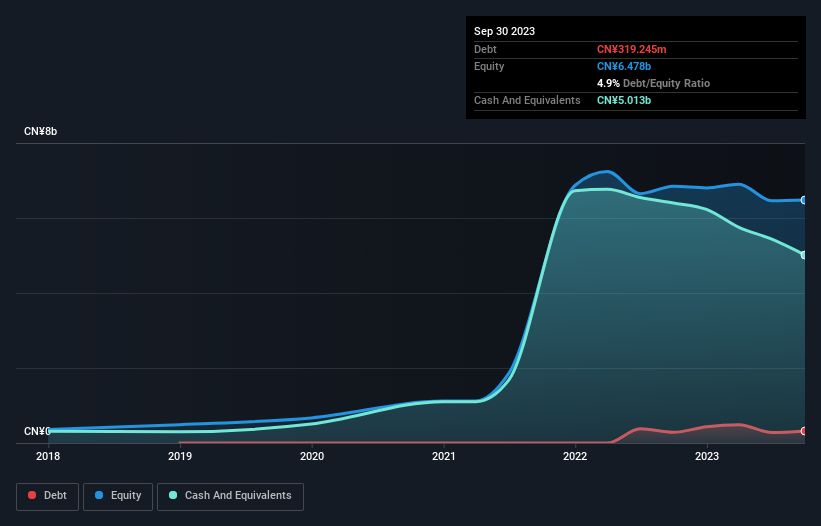
David Iben put it well when he said, 'Volatility is not a risk we care about. What we care about is avoiding the permanent loss of capital.' It's only natural to consider a company's balance sheet when you examine how risky it is, since debt is often involved when a business collapses. Importantly, DR Corporation Limited (SZSE:301177) does carry debt. But the more important question is: how much risk is that debt creating?
What Risk Does Debt Bring?
Debt and other liabilities become risky for a business when it cannot easily fulfill those obligations, either with free cash flow or by raising capital at an attractive price. If things get really bad, the lenders can take control of the business. While that is not too common, we often do see indebted companies permanently diluting shareholders because lenders force them to raise capital at a distressed price. Of course, debt can be an important tool in businesses, particularly capital heavy businesses. When we examine debt levels, we first consider both cash and debt levels, together.
View our latest analysis for DR
What Is DR's Net Debt?
As you can see below, at the end of September 2023, DR had CN¥319.2m of debt, up from CN¥285.1m a year ago. Click the image for more detail. However, its balance sheet shows it holds CN¥5.01b in cash, so it actually has CN¥4.69b net cash.

A Look At DR's Liabilities
The latest balance sheet data shows that DR had liabilities of CN¥1.03b due within a year, and liabilities of CN¥160.0m falling due after that. Offsetting these obligations, it had cash of CN¥5.01b as well as receivables valued at CN¥84.5m due within 12 months. So it actually has CN¥3.91b more liquid assets than total liabilities.
This luscious liquidity implies that DR's balance sheet is sturdy like a giant sequoia tree. Having regard to this fact, we think its balance sheet is as strong as an ox. Simply put, the fact that DR has more cash than debt is arguably a good indication that it can manage its debt safely. The balance sheet is clearly the area to focus on when you are analysing debt. But ultimately the future profitability of the business will decide if DR can strengthen its balance sheet over time. So if you want to see what the professionals think, you might find this free report on analyst profit forecasts to be interesting.
In the last year DR had a loss before interest and tax, and actually shrunk its revenue by 44%, to CN¥2.4b. To be frank that doesn't bode well.
So How Risky Is DR?
Although DR had an earnings before interest and tax (EBIT) loss over the last twelve months, it made a statutory profit of CN¥31m. So taking that on face value, and considering the cash, we don't think its very risky in the near term. We'll feel more comfortable with the stock once EBIT is positive, given the lacklustre revenue growth. There's no doubt that we learn most about debt from the balance sheet. However, not all investment risk resides within the balance sheet - far from it. For example DR has 3 warning signs (and 1 which is concerning) we think you should know about.
If, after all that, you're more interested in a fast growing company with a rock-solid balance sheet, then check out our list of net cash growth stocks without delay.
New: Manage All Your Stock Portfolios in One Place
We've created the ultimate portfolio companion for stock investors, and it's free.
• Connect an unlimited number of Portfolios and see your total in one currency
• Be alerted to new Warning Signs or Risks via email or mobile
• Track the Fair Value of your stocks
Have feedback on this article? Concerned about the content? Get in touch with us directly. Alternatively, email editorial-team (at) simplywallst.com.
This article by Simply Wall St is general in nature. We provide commentary based on historical data and analyst forecasts only using an unbiased methodology and our articles are not intended to be financial advice. It does not constitute a recommendation to buy or sell any stock, and does not take account of your objectives, or your financial situation. We aim to bring you long-term focused analysis driven by fundamental data. Note that our analysis may not factor in the latest price-sensitive company announcements or qualitative material. Simply Wall St has no position in any stocks mentioned.
About SZSE:301177
DR
Researches and develops, produces, and sells diamond jewelry worldwide.
Adequate balance sheet with moderate growth potential.
Market Insights
Community Narratives




